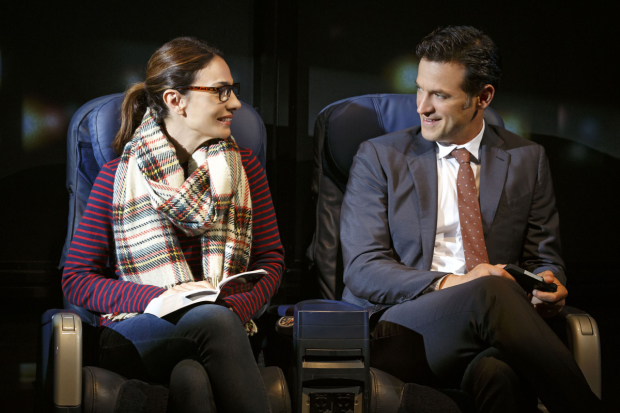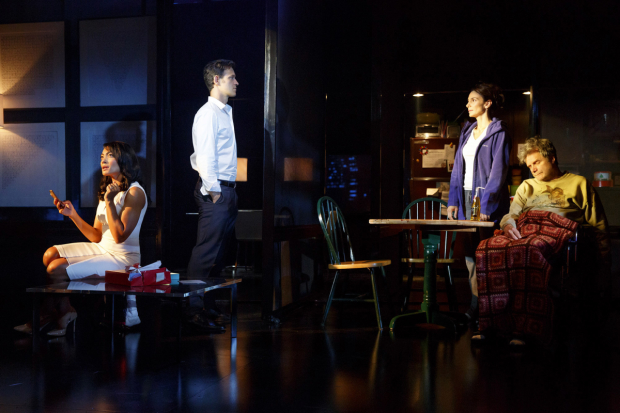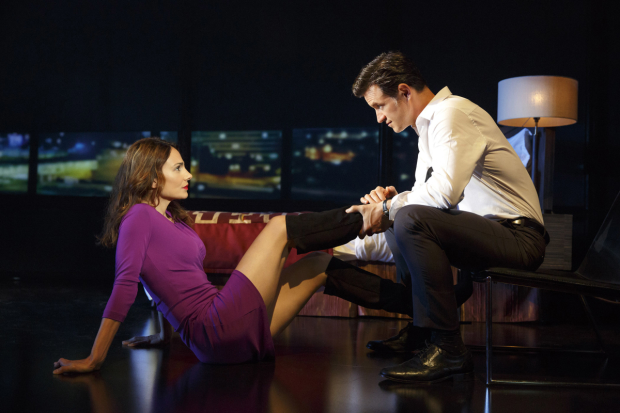The Layover
A brief encounter at the airport becomes a dangerous obsession in Leslye Headland’s latest play.

(© Joan Marcus)
We all do it: You're sitting at the gate at JFK and you begin to make up stories about your fellow passengers, particularly the attractive ones. It's just a harmless way to pass the time, right? Maybe not. Leslye Headland (Bachelorette) dives into the deep dark waters of our narrative instinct in The Layover, her beguiling and unsettling new play at Second Stage Theatre.
The story begins in the business-class cabin of an American Airlines flight from Chicago to New York. It's Thanksgiving and the plane hasn't left the tarmac as a light snow becomes increasingly heavy. Dex (the deep-voiced and handsome Adam Rothenberg) strikes up a conversation with his seatmate, Shellie (affable and bright Annie Parisse). Middle-aged engineer Dex has a whiff of wealthy sophistication about him. Bookish and prickly, Shellie seems more like a walking Salon.com think piece: "You just compared me to every single woman you've ever met," she admonishes him when he points out that he hasn't met a lot of women who like crime novels. "This puts me into a state of questioning my own worth in relation to your opinion, and since we live in a patriarchy, I'm doing that on a subconscious level 24-7 anyway."

(© Joan Marcus)
Naturally, he's smitten by her pugnacious and quirky charm, and the evening progresses to the hotel bar when the flight is canceled. After far too many drinks (scotch for him, cosmos for her), Dex confesses that he had been eyeing Shellie before the flight. "You looked— Misunderstood," he tells her, "As I was standing there, looking at you, I skipped to the part of the story where we already knew each other. And I was the person who knew you best in the world." They take it upstairs.
This story of two combustible strangers brought together by inclement weather could be the plot of any number of Hollywood romantic comedies (or Second Stage's summer offering from two years ago, Sex With Strangers). Certainly, the spontaneous and clandestine aspects of their encounter make it very sexy. But what happens when reality sets in? After all, Shellie is married to Kevin (Quincy Dunn-Baker), a deadbeat who has been swiping and selling the painkillers that should be going to her ailing father, Fred (John Procaccino). Dex is engaged to Andrea (Amelia Workman, looking and sounding like a real housewife of New York), who left her first husband to be with him. Dex and Shellie should just leave it at the O'Hare Marriott. But of course, they don't: He hires a private investigator to track her down and pay all of Fred's medical bills. How romantic?
By adopting and then slowly subverting this well-worn genre, Headland slyly exposes just how toxic our societal narratives of "love at first sight" and the grand gesture can be: We love to hear about the knight in shining armor saving the damsel in distress, but what does he expect from her when he takes her back to the castle? Movies rarely show that part, but The Layover brutally does.
Hammering home popular culture's culpability, director Trip Cullman fills the transitions with multiple screens showing a collage of clips from black and white films (smartly curated video design by Jeff Sugg): Well-dressed couples drink, flirt, and violently embrace. Lighting designer Japhy Weideman disorients us with blinding flashes and searchlights. Fitz Patton's eerie sound design becomes increasingly urgent and distorted in these transitions. During the scenes, Patton sneaks a note of tension under Dex's monologues. This becomes increasingly pronounced as the play progresses, turning this rom-com into a horror flick.

(© Joan Marcus)
In his aching performance, Rothenberg portrays a man suffering from chronic dissatisfaction. No matter how hard he tries, the engineer cannot make the vision in his head manifest itself in reality. Parisse's sturdy and resilient Shellie is far more resigned: A lifetime of disappointment has made her suspicious of good news. Nothing in life is free, after all.
With The Layover, Headland asks some very important questions about the incongruity between reality and the stories we tell ourselves. For instance, while so much of our rhetoric around marriage is drawn from Victorian notions of love, how much of it is really just about economics? Is social class destiny? And when you're the kind of man who has everything, what more do you begin to assume you can buy? These questions will nag you as you leave the theater and beyond. Certainly, it will be hard to watch Hugh Grant romance a (probably much younger) woman on the silver screen with the same amount of innocence you once had.









